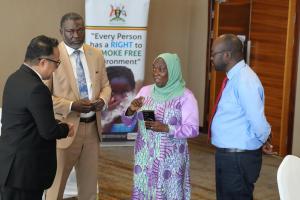Uganda inaugurates second national tobacco control committee to intensify tobacco control efforts in the country
The Ministry of Health, in collaboration with the World Health Organization (WHO) and other partners, inaugurated the second National Tobacco Control Committee (NTCC) during a high-level event held in Kampala. This milestone marks a renewed national commitment to enforcing the Tobacco Control Act and protecting citizens, especially the youth and vulnerable, from the harmful effects of tobacco.
In 2007, Uganda embarked on a transformative journey in tobacco control by ratifying the WHO Framework Convention on Tobacco Control (FCTC). This landmark decision paved the way for comprehensive legislative advancements aimed at safeguarding public health. These efforts culminated in 2015 with the enactment of the Tobacco Control Act, a pivotal moment in Uganda's tobacco control landscape.
The Tobacco Control Act mandates the establishment of the NTCC as a multi-sectoral body to guide, coordinate, and oversee the implementation of tobacco control interventions nationwide.
Presiding over the inauguration, the Minister of Health, Dr Jane Ruth Aceng Ocero, stressed the urgent need to intensify actions aimed at reducing tobacco-related illness and death.
“Tobacco use continues to pose a serious public health threat in Uganda. The formation of this new committee is a critical step in our national strategy to enforce the Tobacco Control Act and prevent new smokers—especially among our youth,” said Dr Aceng. “We are committed to working with all sectors to reduce tobacco use and its devastating effects on our population.”
The NTCC brings together experts and representatives from various ministries and agencies, emphasizing a whole-of-government approach to tobacco control. The committee is tasked with monitoring policy implementation, mobilizing resources, and ensuring compliance with laws banning tobacco advertising, promotion, and sponsorship.
The incoming committee, which will serve for a three-year term, will lead efforts to strengthen the implementation of the tobacco control law and supporting initiatives across the country.
Newly appointed Chairperson Dr Aggrey Ngobi pledged to champion collaborative enforcement measures and proposed stronger penalties for violations of tobacco control laws.
“We must work as one team. Our mandate is clear, and our goal is noble: to protect the health of Ugandans from the dangers of tobacco. We will leverage data, partnerships, and innovation to advance tobacco control in every region of the country,” said Dr. Ngobi.
On behalf of WHO Representative, Dr Suraj Man Shrestha, congratulated the Government of Uganda on this renewed commitment and reiterated WHO’s continued technical and strategic support.
“This initiative reaffirms Uganda’s leadership in the region in advancing tobacco control. WHO stands ready to support the Committee and the Government in scaling up evidence-based policies that save lives and strengthen the health system,” said Dr Shrestha. “Tobacco control is a cornerstone of our shared vision for Universal Health Coverage and the prevention of noncommunicable diseases.”
Dr Shrestha added, “With a smoke-free environment gradually becoming a reality, I can breathe easier knowing my three children are growing up healthier. WHO stands firmly with Uganda on the journey toward achieving its 2030 goals.”
In 2022, the Ministry of Health, in partnership with the World Health Organization (WHO), launched a strategic initiative to empower local law enforcers initially in five regions, with five more currently being added to strengthen enforcement capacity.
From 2022 to 2024, WHO and the Ministry conducted rigorous training programmes in Bugisu, Busoga, Greater Masaka, Bunyoro, and Kigezi, equipping over 155 law enforcers with specialized skills in inspection, public awareness, enforcement operations, compliance assessment, and prosecution. The impact was both immediate and significant, as trained officers began proactively enforcing smoke-free environment laws in their respective urban centers.
The Acting Director General of Health Services, Dr Charles Olaro, acknowledged that while Uganda has made commendable progress in tobacco control, enforcement challenges persist.
“We have made significant strides, but enforcement remains a key challenge. We look forward to the Committee’s oversight in ensuring compliance and increasing public awareness to reduce tobacco use across all demographics,” said Dr Olaro.
The newly inaugurated NTCC is expected to develop an updated roadmap for implementing Uganda’s national tobacco control strategy, strengthen enforcement partnerships, and enhance the use of surveillance and data to inform decision-making.
WHO remains committed to supporting Uganda’s tobacco control efforts through policy development, technical guidance, capacity building, and strong collaboration with the government and partners to protect current and future generations from the harmful effects of tobacco.
(Written by: Warren Chris Bulime)


